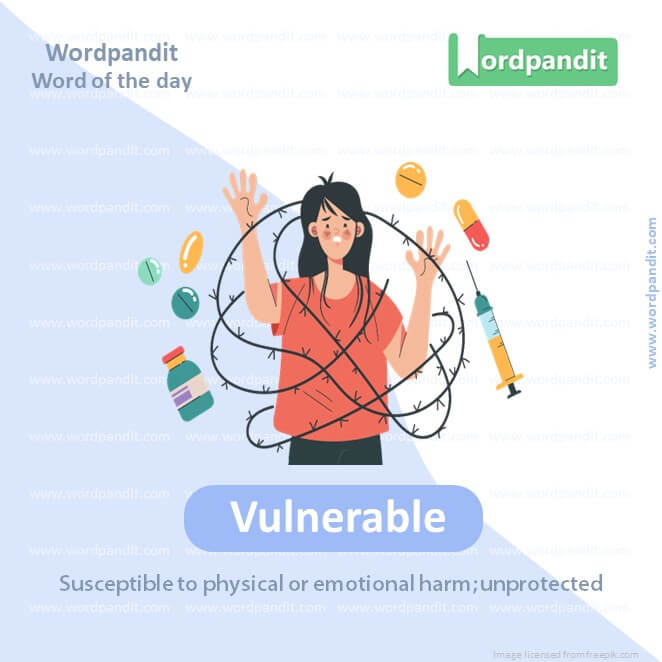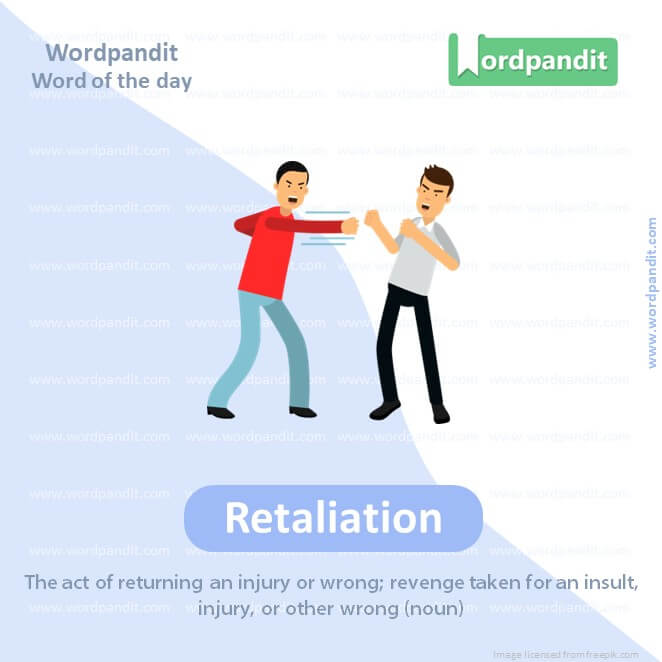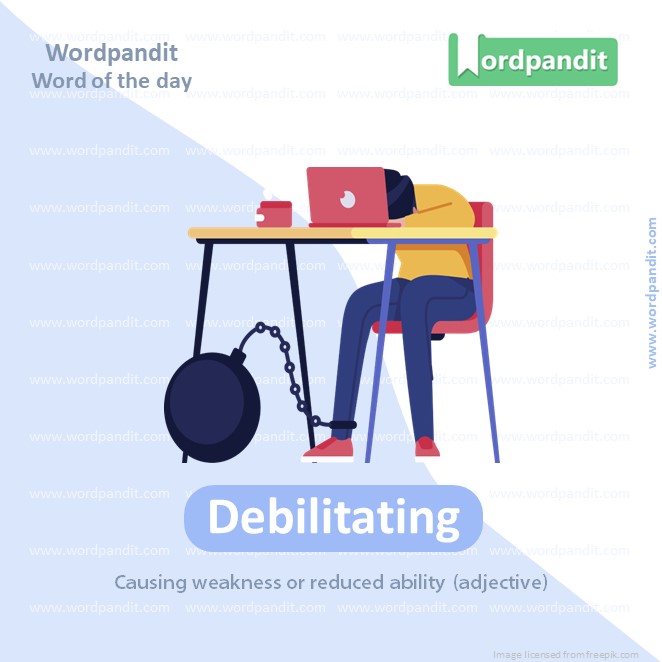Daily Vocabulary Words: List of Daily Used Words
Hi there. Welcome to this special section @ Wordpandit.
Our endeavour here is straightforward: highlighting important daily vocabulary words, you would encounter in The Hindu. This is your repository of commonly used words; essentially, we are posting a list of daily used words. Hence, this has significant practical application as it teaches you words that are commonly used in a leading publication such as The Hindu.
Visit the website daily to learn words from The Hindu.
WORD-1: Emboldens
CONTEXT: When a survivor files a complaint, it emboldens others to speak up, especially when it involves serial offenders.
SOURCE: [Source]
EXPLANATORY PARAGRAPH: Emboldens means to give someone more courage to do something. It’s like when a friend cheers you on, making you feel strong enough to try the high slide at the playground.
MEANING: Gives someone the courage or confidence to do something (verb).
PRONUNCIATION: em-BOWL-dens
SYNONYMS: Encourages, fortifies, heartens, inspires, strengthens, invigorates.
USAGE EXAMPLE:
1. Winning the first match emboldens the team for the next game.
2. Her kind words emboldened him to apply for the job.
3. The support from his family emboldens him to persevere.
4. Positive feedback can embolden students to participate more.

WORD-2: Vulnerable
CONTEXT: The war is set to enter its eighth month, Mr. Biden looks increasingly vulnerable to its regional and domestic consequences.
SOURCE: The Hindu
EXPLANATORY PARAGRAPH: Vulnerable means being easily hurt or affected by something. It’s like when you’re without your umbrella in a rainstorm, you get wet because you’re unprotected.
MEANING: Susceptible to physical or emotional harm;unprotected.
PRONUNCIATION: VUL-ner-uh-bul
SYNONYMS: Exposed, susceptible, open to attack, at risk, defenseless, fragile.
USAGE EXAMPLE:
1. The city’s defenses were vulnerable to attack.
2. Children are especially vulnerable to the effects of poor nutrition.
3. He felt vulnerable and alone in the new school.
4. The system is vulnerable to security breaches.

WORD-3: Relentlessly
CONTEXT: Biden officials have been working relentlessly to achieve a ceasefire and hostage deal between Israel and Hamas.
SOURCE: The Hindu
EXPLANATORY PARAGRAPH: Relentlessly means doing something non-stop, without giving up, no matter how hard it gets. It’s like continuously climbing up the slide, even if you keep slipping down.
MEANING: Doing something without stopping or without showing any sign of
giving up (adverb).
PRONUNCIATION: re-LENT-less-lee
SYNONYMS: Persistently, continuously, unyieldingly, tirelessly, unceasingly, incessantly.
USAGE EXAMPLE:
1. She pursued her goals relentlessly.
2. The team worked relentlessly to meet the deadline.
3. The wind howled relentlessly throughout the night.
4. Critics relentlessly attacked the new policy.

WORD-4: Retaliation
CONTEXT: Mr. Biden’s timely response to shoot down the drones and missiles fired by Iran against Israel and his warning to the Prime Minister of Israel, Benjamin Netanyahu, that the U.S. would not join Israel’s retaliation against Iran, helped ease regional tensions.
SOURCE: The Hindu
EXPLANATORY PARAGRAPH: Retaliation means getting back at someone because they did something to you first. It’s like when someone takes your toy, so you take one of theirs to even things out.
MEANING: The act of returning an injury or wrong; revenge taken for an insult,
injury, or other wrong (noun).
PRONUNCIATION: re-TAL-ee-ay-shun
SYNONYMS: Revenge, reprisal, retribution, payback, counterattack, vengeance.
USAGE EXAMPLE:
1. The strike was a retaliation for the company’s refusal to increase pay.
2. He faced retaliation after whistleblowing on corruption.
3. Countries were warned against any acts of military retaliation.
4. The policy could provoke retaliation from trading partners.

WORD-5: Intransigence
CONTEXT: Even when Mr. Biden seemed frustrated with Mr. Netanyahu’s intransigence, he signed a Bill offering $17 billion in defence aid to Israel.
SOURCE: The Hindu
EXPLANATORY PARAGRAPH: Intransigence means being very stubborn and not wanting to change your opinion or agree with anyone else. It’s like when you refuse to switch games, even though your friends want to play something else.
MEANING: That they refuse to behave differently or to change their attitude to
Something.
PRONUNCIATION: in-TRAN-si-jens
SYNONYMS: Stubbornness, inflexibility, obstinacy, unyieldingness, rigidity, adamance.
USAGE EXAMPLE:
1. The negotiations failed because of the intransigence of both sides.
2. His intransigence on the issue made it difficult to reach an agreement.
3. Political intransigence is blocking the path to peace.
4. She was known for her intransigence during debates.

WORD-6: Debilitating
CONTEXT: Mr. Biden’s words and diplomatic efforts for truce are actually not matched by strong actions to pressure Israel. And, by continuing to arm and bankroll Israel’s genocidal war on Palestinians, Mr. Biden is debilitating his own moral arguments about foreign policy.
SOURCE: The Hindu
EXPLANATORY PARAGRAPH: Debilitating means something that makes you weak or unable to do things normally. It’s like being so tired that you can’t even play.
MEANING: Causing weakness or reduced ability (adjective).
PRONUNCIATION: dee-BIL-i-tay-ting
SYNONYMS: Weakening, disabling, enfeebling, draining, exhausting, incapacitating.
USAGE EXAMPLE:
1. The disease is highly debilitating and affects daily activities.
2. She is recovering from a debilitating injury.
3. The heat was so debilitating that we couldn’t go outside.
4. Debilitating symptoms can lead to depression.
WORD-7: Sullying
CONTEXT: Mr. Biden’s inability to rein in Israel is weakening America’s standing in West Asia and sullying his already fragile candidacy in the U.S. presidential elections in November.
SOURCE: The Hindu
EXPLANATORY PARAGRAPH: Sullying means to make something dirty or spoil its good reputation. It’s like when you accidentally get mud on a clean dress.
MEANING: Damaging the purity or integrity of something (verb).
PRONUNCIATION: SUL-ee-ing
SYNONYMS: Tarnishing, besmirching, staining, defiling, soiling, contaminating.
USAGE EXAMPLE:
1. He regretted the comments that sullied his reputation.
2. The scandal sullied the company’s image.
3. They were accused of sullying the purity of the sport.
4. The river was sullied by pollution.
WORD-8: Dichotomy
CONTEXT: This dichotomy has profound implications for New Delhi’s global aspirations
SOURCE: The Hindu
EXPLANATORY PARAGRAPH: Dichotomy is when there are two things that are completely opposite or very different from each other. It’s like having only two choices: yes or no, with nothing in between.
MEANING: A division or contrast between two things that are entirely different (noun).
PRONUNCIATION: dye-KOT-uh-mee
SYNONYMS: Contrast, split, division, bifurcation, polarity, difference.
USAGE EXAMPLE:
1. The dichotomy between good and evil is often explored in literature.
2. There is a clear dichotomy in her writings between fact and fiction.
3. The conference discussed the dichotomy between science and religion.
4. He was fascinated by the dichotomy of the ancient and modern worlds.
WORD-9: Perplexing
CONTEXT: One of the deeply perplexing paradoxes of contemporary Indian foreign policy is that a globally rising India is also a regionally declining power.
SOURCE: The Hindu
EXPLANATORY PARAGRAPH: Perplexing means something that is very confusing and hard to understand. It’s like a puzzle that you can’t find the last piece for, no matter how hard you look.
MEANING: Completely baffling; very puzzling (adjective).
PRONUNCIATION: per-PLEX-ing
SYNONYMS: Confusing, puzzling, bewildering, mystifying, confounding, incomprehensible.
USAGE EXAMPLE:
1. The problem was so perplexing that it took hours to solve.
2. She found his behavior utterly perplexing.
3. The instructions were written in a perplexing manner.
4. The sudden change in policy was perplexing to many.
WORD-10: Extraneous
CONTEXT: This comparative decline, not an absolute one, caused by several extraneous factors, will have an impact on India’s global position over time.
SOURCE: The Hindu
EXPLANATORY PARAGRAPH: Extraneous means something that is not necessary or not a part of something. It’s like having extra pieces that don’t fit into your toy set.
MEANING: Irrelevant or unrelated to the subject being dealt with (adjective).
PRONUNCIATION: ek-STRAY-nee-us
SYNONYMS: Irrelevant, inessential, unnecessary, superfluous, incidental, peripheral.
USAGE EXAMPLE:
1. The editor removed all extraneous information from the article.
2. Try not to include any extraneous details in your report.
3. The discussion was bogged down by too many extraneous arguments.
4. He focused on removing all extraneous costs from the budget.
Vocabulary Words for IELTS'
Preparing for an esteemed examination like IELTS urges a diligent focus on ‘vocabulary words for IELTS’. These specific words, frequently prominent in IELTS examinations, play a vital role in expressing ideas effectively and articulately. To successfully conquer ‘vocabulary words for IELTS’, a strategic and focused approach is quintessential.
A fundamental step when learning ‘vocabulary words for IELTS’ is understanding these words in the context of use. For this, exposure to diverse resources like newspapers, journals, academic texts, and digital content is crucial. This engagement aids in understanding the nuances of these words, fortifying your preparation for ‘vocabulary words for IELTS’.
When tackling ‘vocabulary words for IELTS’, regular practice is the cornerstone of success. Consistent writing and speaking exercises help in embedding this vocabulary in your linguistic repertoire. Take situations or topics that commonly appear in the IELTS exam and practice crafting complex yet coherent sentences using these words.
In the journey to unfold ‘vocabulary words for IELTS’, making use of memory-enhancement techniques can orchestrate your success. Tools like flashcards and recall-based applications can significantly assist in retaining and reinforcing these words in your memory. Additionally, forming personal connections or stories with these words can greatly improve word recall.
Brevity is equally significant when preparing for ‘vocabulary words for IELTS’. Attempt to learn a limited number of words each day rather than tackling a large list all at once. This habit allows the brain adequate time to absorb and store these words securely, ensuring an effective learning experience.
In conclusion, the quest to master ‘vocabulary words for IELTS’ is an engaging dance of comprehension, practice, memory techniques, and thoughtful pacing. As you pirouette gracefully through these strategies, you’ll find communicating your IELTS responses with the right ‘vocabulary words for IELTS’ is less of a cliffhanger and more of an epic tale of language success.










